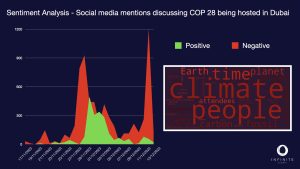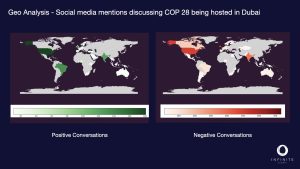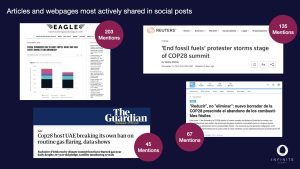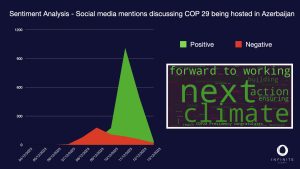Tracking the narrative: COP 28 in Dubai, audience perceptions and national reputations
December 14, 2023
The November 2021 announcement of the United Nations annual ‘Conference of Parties’ event being held in the United Arab Emirates saw considerable pushback from many global communities. Concerns around a petrostates ability to host an event whose expected purpose is to address climate issues and provide guidance and a direction of travel for nations own energy policies were highly visible across both traditional and social media.

Our multi-language analysis of relevant social media conversations confirmed that these concerns have become even more concentrated over the course of the event, with negative sentiment peaking in response to an on-stage protest against the continuing use of fossil fuels from Licypriya Kangujam, a 12 year old Indian climate activist, on the 12th December.
Topic analysis also confirmed that broader human rights concerns about the United Arab Emirates were amplified by the event which, rather than improve global perceptions of the nation, presents the risk of negative impact on the nation’s reputation going forward.

Although the negative response was certainly more prevalent, we identified that many of the national audiences engaged in conversation around the event were also the source of positive conversations. Audiences in the United States, Brazil and India were most active here while both Nigeria and the UK also saw some visible positive response to the event.

Analysis of the online articles most shared in conversations relating to UAE’s hosting of COP 28 confirmed that the surge in negative sentiment we identified in response to Licypriya Kangujam’s onstage protest was most likely in response to extensive media coverage of the incident – with both Reuters and France 24’s coverage seeing prominence in audience’s social media posts.

Of the media articles discussing the event shared on social media, those from the Economist and Reuters saw the most prominence while Indian and North American news organisations also saw a high degree of reach via social posts. Analysis of the sentiment of these articles saw a balance between positive and negative sentiment, which is expected given most are news sources who are not known for overly biased reporting.

In a somewhat bold move, the next COP will also be held in a petrostate – this time Azerbaijan, a nation which often sees active criticism for its human rights record and ongoing territorial disputes with Armenia which resulted in open conflict earlier this year.
Our analysis confirmed that, likely in anticipation of this, there have been very active efforts on social media to drive a positive response to this announcement and no doubt with the ambition of setting a foundational narrative which the new host nation can build on over the next twelve months.
Whether or not this is an effective tactic remains to be seen however since, as the climate crisis worsens, both expectations and criticism of the Conference of Parties and its role in addressing this will inevitably increase – which in turn will impact the perceptions and reputations of host nations.
How can we help?
Get in touch with our team



